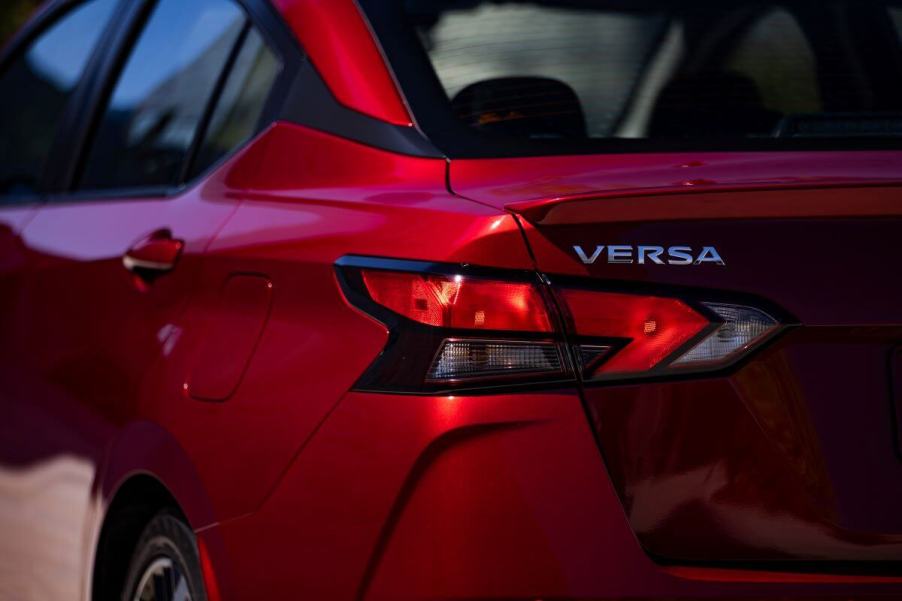
Nissan Versa Owners Least Favorite Parts of Their Car Aren’t Quite Fair
Nissan Versa is an affordable, entry-level car that’s been around for nearly two decades. Popular with commuters, first-time buyers, and students, the Versa is known for its compact size, practicality, and reliability. However, with any budget-friendly vehicle, there are many features you don’t get, like power, convenience features, and interior comforts.
Recently, J.D. Power conducted an APPEAL study that illustrated how some owners had difficulty accepting the tradeoffs of purchasing an entry-level car. What did owners in that study have to say about the Nissan Versa?
A look at the Nissan Versa
The Nissan Versa is a subcompact car designed to be an affordable, reliable offering in the auto market. It’s in the same class as the Hyundai Accent, Kia Rio, and Chevy Spark. The segment is known for affordability, fuel efficiency, and reliability.
The Versa is priced even lower than some of its peers, making it a very appealing option for those on a tight budget, such as first-time buyers or students. Even so, Nissan has given it an impressive array of standard features like a touchscreen for the infotainment system, a four-speaker audio system, Siri Eyes Free, voice recognition, and more.
The Nissan Versa is powered by a four-cylinder engine with a power output of 122 horsepower. It’s paired with a manual five-speed transmission for the base model, but an automatic CVT is also available. You won’t win any races with either powertrain, but there’s a big difference between the two regarding gas mileage. According to Car and Driver, with the manual transmission, you’ll get an estimated 27 mpg in the city and 35 mpg on the highway. With the CVT, testers got 40 mpg in their testing.
The J.D. Power APPEAL study
The Automotive Performance, Execution, and Layout (APEAL) Study is one of several studies conducted by J.D. Power in the automotive industry. It measures how satisfying a new vehicle is to drive and own in the first 90 days of ownership. The study assesses eight design and performance categories, including driving dynamics, exterior styling, interior design, features and amenities, climate control, seating comfort, fuel economy, and infotainment system.
The study rates consumer satisfaction on a 1,000-point scale; the higher the score, the higher the satisfaction level. Automakers use the study results to improve their offerings and customers’ experience.
Buying an entry-level car has distinct advantages and disadvantages; knowing the tradeoffs before purchasing is important. They are more affordable, often get good gas mileage, and are small and easy to navigate. Insurance rates are usually less expensive. At the same time, they have limited options, limited power, and lower resale value. They also typically don’t have advanced safety features, upscale audio systems, or posh interior materials.
What Versa owners didn’t like

According to the 2023 study, 61% of new Nissan Versa buyers are male, with the median age of the buyer being 45 years old. When asked to put the evaluation categories in order of features they appreciated to those that were their least favorite, the study found that fuel economy, exterior styling, and driving feel were the top three. Interior design, the powertrain, and driving comfort were the least favorite Versa qualities, according to the study.
While Versa owners wish the car had a better powertrain, nicer cabin, and was more comfortable, those traits are likely the result of keeping the vehicle’s cost down.
The Versa’s low-sloping roof limits headroom in the back seat, but it offers more front-seat head and legroom than the Kia Rio or Mitsubishi Mirage, according to J.D. Power. There is also room to move those front seats forward to provide more legroom for rear passengers. Additionally, there’s a new standard center armrest in the higher SV and SR trims.
The right vehicle for any buyer meets their individual budget and needs. While entry-level cars offer attractive savings, they may not be the best choice for everyone.



